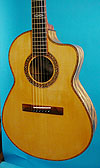 |
This guitar is a 12-fret 000C made of laurel/bay wood. I used abalam as the background of the rosette.
|
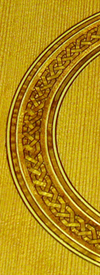 |
Here’s the fairly simple version of the above rosette on the baritone guitar I built for Ken Bonfield. |
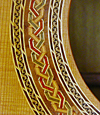 |
Here’s a more complicated rosette, with some small end grain tiles, used on a classical guitar that back and sides of Osage Orange. |
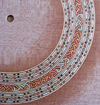 |
Later a few more jigs were constructed to make a "return" for the braid, producing a true interlacement. This rosette was made for a redwood and walnut classical guitar. |
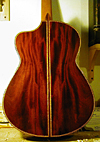 |
Speaking of classical guitars, here’s the back of one made from some Caribbean mahogany I got from Carleen Hutchins almost thirty years ago. The purfling is curly koa with ebony and maple veneer. |
 |
A rather more unusual classical was this one; an archtop. I had built two prior to this one that I considered less than successful in terms of sound, but they gave me the information I needed to make one that would work right, or so I believed. A very kind customer was willing to take a chance on my being right, in return for a discount on the price of the guitar. In this case the gamble seems to have paid off for both of us. The top is Engelmann spruce, and the B&S mahogany. |
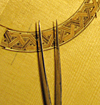 |
The process for doing the abalam background on the bay guitar is the same that I used on this rosette, but in this case the background is mammoth ivory. |
 |
Although I tell people that this one came about from eating too much pizza late in the evening, in fact it’s more complex than that. It really all started when I went to the ’Dangerous Curves’ exhibition at the Boston Museum of Fine Arts back in late 2000 or early 2001. As I looked at the harp guitars I was struck by a contrary mood, and realized that they were actually ‘zither-guitars’, since the drone strings were all parallel to the soundboard surface, rather than pulling upwards as harp strings do. By the time I left the building I had started to think about ways to make ‘real’ harp guitars.
|
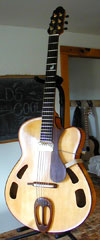 |
Here’s a small bodied archtop that was built as a custom order. A lot of the design features were arrived at in collaboration with the customer as we went along. This is a shot showing one possible shape of pickguard that we tried out. |

